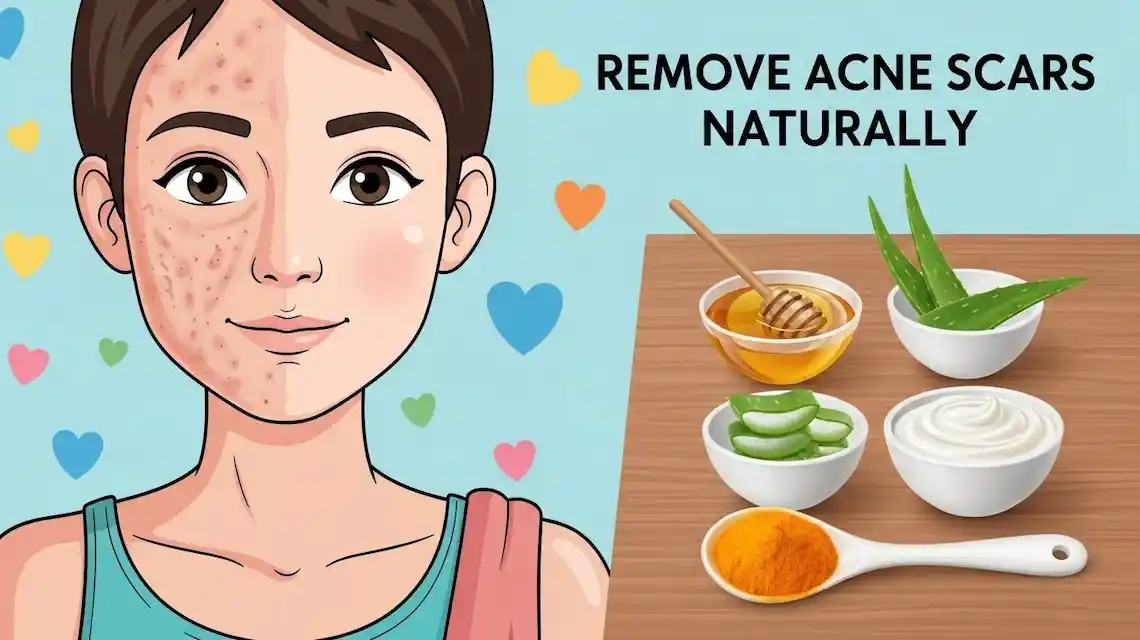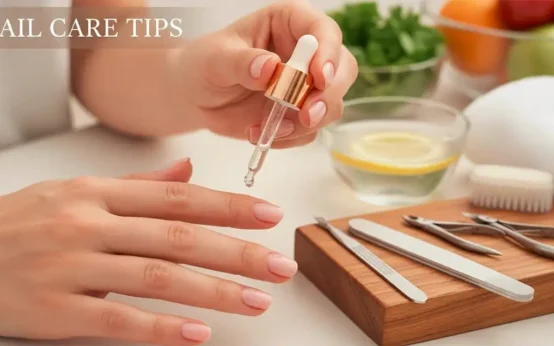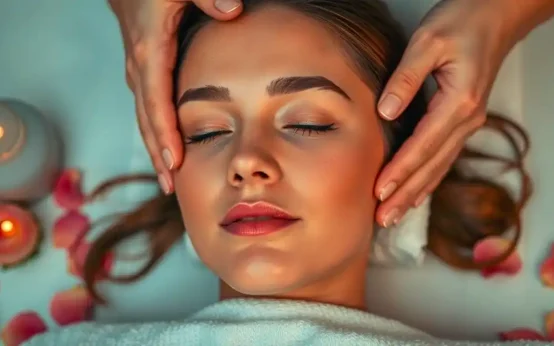Tired of those marks that hang around long after a breakout fades? If you want a gentle plan for how to treat acne scars at home naturally, you’re in the right place. You can soften the look of scars, even your tone, and support healing with simple, consistent habits.
Acne scars are changes in the skin where a pimple healed. Some dip in, some raise up, and many leave dark spots that can linger. People often choose natural options to avoid harsh chemicals, protect sensitive skin, and keep costs down.
This guide shows you what causes scars and what really helps at home. We’ll cover proven natural helpers like sunscreen, aloe, honey, rosehip oil, gentle acids from fruit extracts, and soothing teas. We’ll also note what to skip, like rough scrubs or DIY mixes that can irritate or stain.
You’ll get easy application tips you can follow today, such as how often to use a remedy, how long to leave it on, and how to patch test first. You’ll also learn when to pause a product, how to avoid sun-related darkening, and when it’s time to see a pro.
You do not need a shelf full of products to see progress. You need patience, a few safe ingredients, and a steady routine. Keep reading for causes, step-by-step home remedies, simple routines, and smart precautions that protect your skin while it improves.
Understanding Acne Scars: Types and What Makes Them Fade Naturally
If you ask how to treat acne scars at home naturally, start by knowing what you are dealing with. Scars form when the skin repairs damage after deep breakouts. Some create texture changes, others leave lingering color.
Here are the common types, in plain language:
- Ice pick scars: Small, deep pin-like pits that look narrow at the surface.
- Boxcar scars: Wider, shallow to medium dents with sharper edges.
- Rolling scars: Wavy dips that make the skin look uneven.
- Hypertrophic or keloid scars: Raised bumps where too much collagen formed.
- Post-inflammatory hyperpigmentation (PIH): Flat dark marks left after acne. These are not true scars, but they can take months to fade.
Why do natural methods help? They support how your skin heals:
- Reduce inflammation so redness and swelling settle down.
- Boost collagen with skin-friendly nutrients and gentle actives.
- Support cell turnover so dark marks fade more evenly.
- Protect the barrier so skin stays calm and resilient.
Lifestyle matters. A few small choices speed progress:
- Eat protein, vitamin C, zinc, and omega-3s to fuel collagen.
- Limit high sugar spikes that can drive oil and inflammation.
- Avoid smoking, which slows healing.
- Guard your skin from the sun. UV can lock in dark spots and thicken scars.
- Sleep well and manage stress to balance hormones that trigger breakouts.
Common Causes of Acne Scars You Can Avoid
Most scars come from injury during the breakout or poor aftercare. You can prevent many with simple habits.
- Picking or popping pushes bacteria and oil deeper, which tears tissue.
- Severe or cystic acne inflames deeper layers and risks permanent marks.
- Harsh scrubs and strong actives irritate skin and delay healing.
- Skipping sunscreen lets UV darken healing spots and slows fade time.
- Dirty makeup tools or pillowcases add bacteria and friction.
- Occlusive, comedogenic products trap oil and prolong breakouts.
Prevention tips:
- Keep hands off and use spot patches if needed.
- Cleanse gently twice daily, then moisturize to protect the barrier.
- Choose non-comedogenic products and avoid over-exfoliation.
- Wear broad-spectrum SPF 30+ every day, even indoors near windows.
- Treat new breakouts early with a calm, consistent routine.
Best Natural Remedies to Treat Acne Scars at Home
Simple, safe ingredients can support fading without stressing your skin. Always patch test on the inner arm or behind the ear for 24 hours, then start slow. Consistency beats intensity. If you want to know how to treat acne scars at home naturally, work these into a steady routine and give them time.
- Coconut oil: Seals in moisture and softens texture, but can clog pores. Use only on dry, healed areas or body scars. Massage a pea-size amount over rough patches 3 to 4 times a week, then cleanse. Expect smoother feel, not instant fading.
- Rosehip oil: Rich in fatty acids and natural vitamin A compounds. Apply 2 to 3 drops to damp skin at night. Supports tone and brightness over 6 to 8 weeks.
Aloe Vera: Soothe and Heal Your Scars Gently
Fresh aloe hydrates, calms, and supports a healthier skin barrier, which helps dark marks look softer over time. Scoop 1 teaspoon of fresh aloe gel from a leaf, then mix with 2 to 3 drops of vitamin E oil. Apply a thin layer to clean, dry skin at night. Leave on, then rinse in the morning and use SPF. For oily or sensitive skin, keep it to the scarred areas. Use nightly for 6 to 8 weeks. Expect better hydration, less redness, and a smoother look. If any itching or bumps appear, pause, patch test again, and reduce frequency.
Honey and Cinnamon Mask: Fight Inflammation Naturally
Raw honey is soothing and humectant, while a pinch of cinnamon adds mild antimicrobial support. Mix 1 tablespoon raw honey with 1/8 teaspoon cinnamon. Apply to clean skin once a week for 10 to 15 minutes. Rinse with lukewarm water, pat dry, and moisturize. This combo helps reduce redness and keeps skin calm so dark spots can fade more evenly. Sensitive skin? Use honey alone and skip cinnamon. Store the leftover mix in a sealed jar in the fridge for up to 3 days, and stir before use. Watch for warmth or tingling, and wash off sooner if it stings.
Lemon Juice for Brightening: Use with Caution
Lemon can brighten dark marks due to natural acids, but it can irritate. Always dilute. Mix 1 part fresh lemon juice with 3 parts water. After cleansing, dab the mix onto dark spots with a cotton swab, wait 5 minutes, then rinse and moisturize. Start twice a week only. Avoid open pimples, cuts, or very sensitive areas. Always wear broad-spectrum SPF 30 or higher the next day because lemon increases sun sensitivity. If you notice stinging, dryness, or more redness, stop and switch to gentler options like aloe or rosehip oil. Consistency and sun care drive results.
Daily Routines and Tips for Faster Results on Acne Scars
Consistency beats intensity. A steady routine, smart sun care, and simple habits move the needle faster than a drawer full of products. If you want to know how to treat acne scars at home naturally, focus on daily steps you can repeat and give the plan 4 to 8 weeks.
Building a Consistent Home Treatment Plan
Here is a simple morning and evening plan that uses the natural remedies above.
Morning:
- Cleanse gently with lukewarm water and a mild, non-stripping cleanser.
- Apply a thin layer of aloe vera gel to calm skin and support the barrier.
- Moisturize with a light, non-comedogenic cream to seal in hydration.
- Finish with broad-spectrum SPF 30+. This is non-negotiable. UV darkens spots and slows fading.
- Optional: If you used lemon the night before, be extra diligent with sunscreen.
Evening:
- Cleanse to remove sunscreen and oil.
- Two nights per week, dab diluted lemon juice on dark spots only, wait 5 minutes, then rinse. Follow with moisturizer.
- On other nights, press in 2 to 3 drops of rosehip oil on damp skin, then moisturize.
- For very dry, healed areas only, use a tiny amount of coconut oil 3 nights a week. Avoid active breakouts.
- Once a week, use the honey mask for 10 to 15 minutes, then rinse and moisturize.
Gentle exfoliation helps. Use a mild enzyme or lactic acid product once a week at night. Skip on nights you use lemon. Never scrub.
A few habits speed results:
- Hydrate well: Aim for water with each meal and snack.
- Eat for skin: Build plates with berries, citrus, leafy greens, beans, salmon, eggs, nuts, and seeds. These support collagen and calm inflammation.
- Moisturize daily: Well-hydrated skin heals and looks smoother.
- Sun protection: Reapply SPF every 2 to 3 hours if outdoors.
Track progress with weekly photos in the same lighting. Small changes add up, and this keeps you motivated while your skin improves over 4 to 8 weeks.
Precautions and When Natural Home Treatments Aren’t Enough
Natural care can help, but safety comes first. If you want to know how to treat acne scars at home naturally, use a careful, steady approach and listen to your skin.
Patch Testing and Safe Use
New ingredients can irritate. Always patch test on a small area for 24 hours before putting anything on your face. Avoid open wounds, cystic breakouts, or broken skin. Keep acids like lemon well diluted, use gentle pressure, and limit frequency. Stop if you feel stinging, tightness, or see more redness. People with nut, pollen, or bee-product allergies should avoid related oils and raw honey.
For extra support from the inside, choose foods that heal acne scars like vitamin C rich produce and protein to aid collagen. See this guide on foods that keep your skin clear
When to See a Professional
Home care has limits. Seek help if you have:
- Ice pick, boxcar, or deep rolling scars
- Raised keloids or painful bumps
- No improvement after 8 to 12 weeks
- Ongoing breakouts that keep scarring
Medical Options to Know
A dermatologist can tailor treatments like microneedling, chemical peels, TCA CROSS, laser, steroid injections for keloids, or fillers for deeper dents. These require proper screening and aftercare.
Keep going with your gentle routine, protect your skin in the sun, and track steady gains. With patience and smart choices, home methods can make real progress.
Conclusion
You now have a clear, simple plan for how to treat acne scars at home naturally. Keep your routine gentle, stay consistent, and protect your skin from the sun every day. Small, steady habits add up. Hydrate, moisturize, patch test, and stick with safe brighteners and soothing oils. Avoid picking and harsh scrubs, since calm skin heals and fades more evenly.
Progress takes time. Most natural options need several weeks, and that is normal. Track results with weekly photos in the same light, then adjust slowly based on how your skin feels. If scars are deep or raised, home care can support your results while you talk with a pro about targeted treatments.
Start now. Choose one remedy that fits your skin and use it this week. Share what you try, how often you use it, and how your skin responds in the comments. Your experience can help someone else feel less stuck. Patience and smart habits build confidence, and your skin will reflect it.
Related post: How Gut Health Affects Your Skin
FAQ:
What types of acne scars can improve with home care?
Dark marks and redness after acne, called post‑inflammatory hyperpigmentation and erythema, respond best. Shallow textural dents may soften a little with consistent care. Deep icepick or boxcar scars usually need in‑office treatments.
Can natural remedies erase acne scars completely?
No. Home care can fade discoloration and smooth mild texture. It will not remove deep or pitted scars. Set goals around gradual fading and better skin tone.
Which natural ingredients help fade dark marks?
- Vitamin C, brightens and evens tone.
- Azelaic acid 10 percent, lightens marks and calms bumps.
- Lactic or mandelic acid, gentle exfoliation that targets dullness.
- Licorice extract and niacinamide, reduce uneven pigment.
Use sunscreen daily with any brightening plan.
How does sunscreen help scars fade faster?
UV light locks in dark marks. A broad‑spectrum SPF 30 or higher stops new pigment triggers, prevents redness from lingering, and protects new collagen. Reapply every 2 hours when outdoors.
Is vitamin C effective for acne marks, and how should I use it?
Yes, it helps fade brown spots and supports collagen. Choose L‑ascorbic acid 10 to 20 percent or a stable derivative if you have sensitive skin. Apply in the morning after cleansing, then use sunscreen.
Do AHAs or BHAs help, and are they safe at home?
Yes, when used correctly. Lactic or mandelic acid 5 to 10 percent, 1 to 3 nights a week, smooths texture and brightens. Salicylic acid 0.5 to 2 percent helps clogged pores and can reduce marks. Start slow, moisturize, and avoid mixing many actives in one routine.
Can retinoids help acne scars at home?
Over‑the‑counter retinol or adapalene can boost cell turnover and collagen. They may soften shallow dents and fade marks over months. Use a pea‑size amount at night, 2 to 3 times weekly, then increase as tolerated. Always pair with sunscreen.
Do aloe vera, honey, or rosehip oil help?
- Aloe vera, soothes and may aid healing, mild effect on marks.
- Honey, supports wound care, limited effect on old scars.
- Rosehip or tamanu oil, can improve tone and texture for some users.
These can complement, not replace, proven actives like vitamin C, azelaic acid, or AHAs.
Are silicone sheets or gel good for raised scars?
Yes. Silicone gel or sheets flatten and soften raised scars over time. Use daily for 8 to 12 weeks or longer. Massage the area gently when applying.
Can facial massage or tools reshape scars?
Massage may help raised scars with silicone use, but it will not lift deep pits. Avoid aggressive scraping or strong suction, which can inflame skin and worsen marks.
Should I try microneedling at home?
No. At‑home devices carry risks of infection, pigment changes, and more scarring. Professional microneedling uses sterile tools, proper depth, and trained technique.
How long before I see results?
Expect small changes in 4 to 8 weeks, clearer gains by 3 to 6 months. Raised scars with silicone may take 2 to 6 months. Consistency matters more than intensity.
What’s a simple daily routine for fading acne marks naturally?
- Morning, gentle cleanse, vitamin C or azelaic acid, moisturizer, SPF 30 or higher.
- Night, cleanse, AHA or retinoid on alternate nights, moisturizer.
Patch test new products on the jawline for 3 days before full use.
What should I avoid so scars do not look worse?
- Picking or popping, it deepens scars.
- Harsh scrubs or undiluted essential oils, they irritate and stain skin.
- DIY lemon juice or baking soda, high risk of burns or imbalance.
- Overusing actives, space them to protect your barrier.
Can diet or supplements help acne scars?
Diet has more effect on breakouts than scars. A lower glycemic load and moderating dairy may reduce new acne for some people. Fewer breakouts means fewer new scars. No supplement reliably fades scars, though adequate protein, vitamin C, zinc, and sleep support healing.
How do I treat acne and scars at the same time?
Keep acne calm first, then fade marks. Use a gentle cleanser, non‑comedogenic moisturizer, and daily sunscreen. Add salicylic acid or adapalene for breakouts, then layer brighteners like azelaic acid or vitamin C for marks.
Do at‑home peels help?
Mild lactic or mandelic peels can brighten and smooth when used as directed. Stick to low strengths you can buy over the counter. Do not stack acids or peel over irritated skin.
Are natural remedies safe for darker skin tones?
Yes, with care. Azelaic acid, niacinamide, mandelic acid, vitamin C, and sunscreen work well. Avoid harsh scrubs and strong peels at home, since they can trigger more pigment.
When should I see a dermatologist?
Book a visit if you have deep pits, tethered scars, or thick raised scars. Also seek help if home care irritates your skin or if marks do not fade after 3 to 6 months. Professional options include microneedling, lasers, peels, subcision, and fillers.




 How To Remove Sun Tan From Hands
How To Remove Sun Tan From Hands  How to Take Care Your Nails
How to Take Care Your Nails  How to Improve Good Cholesterol (HDL)
How to Improve Good Cholesterol (HDL)  Hormone Health Tips for Women
Hormone Health Tips for Women  Heal Dry Damaged Hair: A Simple Plan That Works
Heal Dry Damaged Hair: A Simple Plan That Works  How to Look Much Younger Without Drastic Changes
How to Look Much Younger Without Drastic Changes